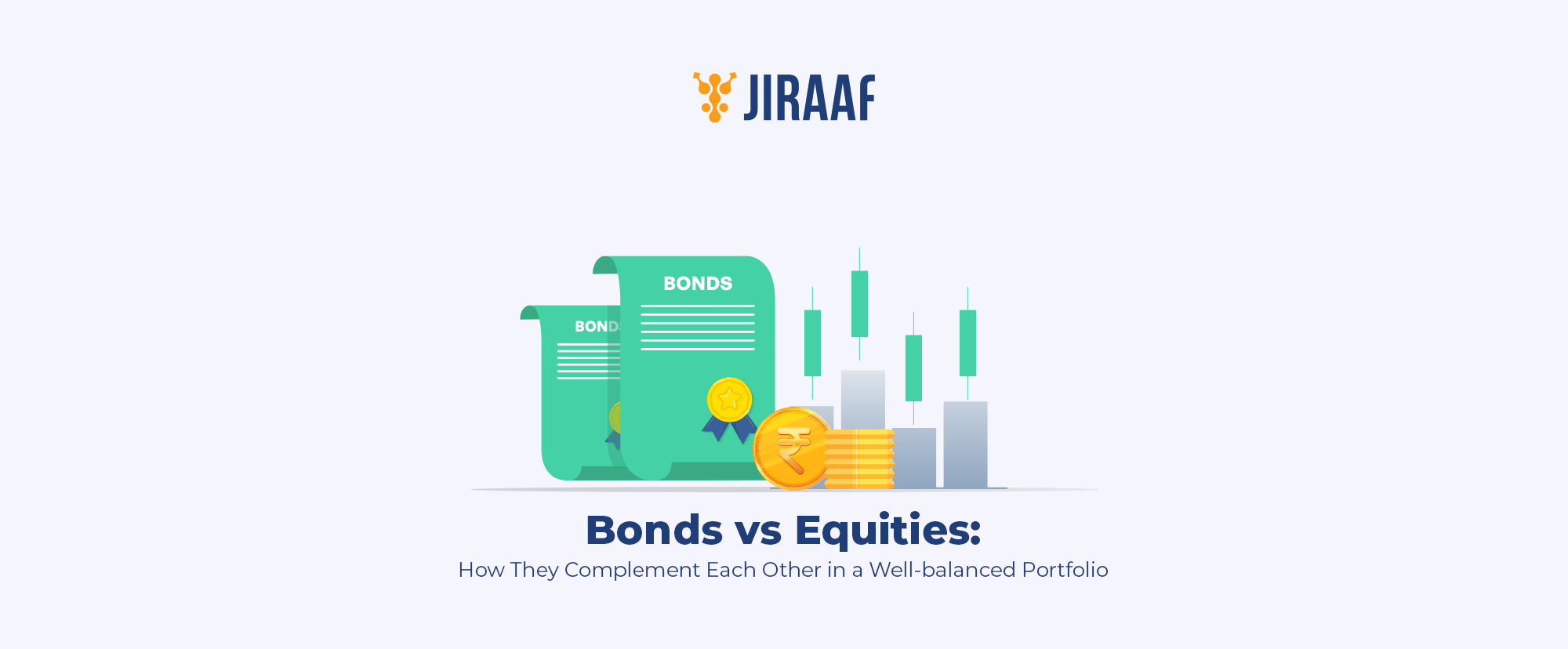When deciding where to invest, investors often find themselves weighing bonds and equities as wealth creation options. The answer may not lie in choosing one over the other but to find the right balance between the two. Both asset classes offer distinct advantages and risks, and understanding the differences can help investors tailor their portfolios to meet their financial goals.
This blog will compare bonds and equities, focusing on their key characteristics, benefits, risks, and taxation, to guide you in making a well-informed investment decision.
What are Equities?
Equities represent ownership in a company. When you purchase shares of stock, you become a partial owner of the company and are entitled to a share of its profits, typically paid out as dividends, as well as potential capital gains if the stock price increases.
How Do Equities Work in India?
In India, equities are traded on stock exchanges such as National Stock Exchange (NSE) and Bombay Stock Exchange (BSE). Investors can buy and sell shares of companies through brokers. Returns come from dividends and capital appreciation, depending on the company’s performance and market conditions.
Types of Equities
- Blue-Chip Stocks: These are shares of large, established companies with a strong track record of stability and reliable performance. Examples of such stocks include Reliance Industries, HUL, and Tata Consultancy Services (TCS).
- Mid-Cap and Small-Cap Stocks: This refers to shares of companies which have medium- to small-scale market capitalizations. Mid-cap stocks usually offer a balance between growth and stability, while small-cap stocks can be more volatile and riskier but having potentially higher growth prospects.
- Dividend Stocks: These are shares of companies that regularly distribute a portion of their profits to shareholders as dividends. These stocks provide a steady income stream in addition to potential capital appreciation.
- Equity Mutual Funds: Equity mutual funds are investment funds that pool in money from multiple investors to invest in a diversified portfolio of stocks. These funds are managed by professionals and can include large-cap, mid-cap, small-cap, or sector-specific funds.
- Exchange-traded Funds (ETFs): ETFs are funds traded on stock exchanges that track specific indices or sectors. ETFs offer liquidity and can include a broad range of equities or a specific market segment.
What are Bonds?
Bonds are debt securities issued by corporations, municipalities, and governments to raise capital. Investors who buy bonds are lending money to the issuer in exchange for periodic interest payments and the return of the principal amount at maturity.
How Do Bonds Work in India?
In India, bonds can be issued by the government, corporations, or municipal bodies. Investors receive regular interest payments (coupons) throughout the bond’s tenure. At maturity, the issuer returns the principal amount. Bonds can also be traded on secondary markets at profit or loss before maturity. Liquidity, which is determined by the ability of the owner to sell the security before maturity, is less for bonds compared to equities.
Types of Bonds
- Government Bonds: Issued by the central or state governments, these are low-risk securities that come with sovereign guarantee. Examples include Sovereign Gold Bonds, Treasury Bills, Government Securities (G-Secs), Government Savings Bonds, State Bonds, etc.
- Corporate Bonds: Issued by corporations to raise capital, these bonds generally offer higher returns compared to government bonds but come with increased credit risk. Corporate bonds are typically rated by credit agencies such as CRISIL and ICRA.
- Municipal Bonds: Issued by local government bodies, these bonds are used to finance public infrastructure projects. They offer a moderate risk level and may provide tax benefits under certain conditions.
- Tax-Free Bonds: Issued by entities like Indian Railways Finance Corporation (IRFC), National Highways Authority of India (NHAI), and Power Finance Corporation (PFC), these bonds offer interest income that is exempt from income tax under Section 10(15) of the Income Tax Act.
- Fixed Maturity Plans (FMPs): These are closed-end mutual fund schemes that invest in fixed-income securities with a defined maturity period, often mimicking the characteristics of bonds.
Difference between Bonds and Equities
Bonds and equities are two types of investments, each offering unique advantages and risks. Here’s a comparison of key features:
| Feature | Bonds | Equities |
| Nature | Issuer borrows money and pays interest | Investor owns a share of the company |
| Returns | Stable returns through regular interest payments | Capital appreciation if stock price increases, plus dividends |
| Risk | Bonds generally have lower risk, less volatility | Equities are generally having higher risk, more volatility |
| Income | Predictable income through interest payments | Income through dividends, if declared |
| Potential for Growth | Limited to interest payments | High potential for capital gains and reinvested dividends |
| Ownership & Voting Rights | No ownership or voting rights | Equity investors have voting rights and ownership in the company |
| Tax Benefits | Certain bonds offer tax-free interest income | Lower capital gains tax rates compared to interest income on bonds |
| Role in Portfolio | Used for capital preservation and stable income | Used for growth and potential high returns |
What are the Benefits of Investing in Bonds and Equities in India?
Benefits of Investing in Bonds
- Stable Returns: Bonds provide predictable income through regular interest payments
- Capital Preservation: The return of the principal amount at maturity ensures capital preservation.
- Diversification: Bonds can add stability to a portfolio dominated by volatile equities
- Tax Benefits: Certain bonds offer tax-free interest income.
Benefits of Investing in Equity
- Capital Appreciation: Equities have a potential for significant capital gains if the stock price increases
- Dividends: Regular dividend payments provide income and can be reinvested
- Ownership: Equity investors have voting rights and a share in the company’s growth
- Liquidity: Shares can be easily bought and sold on stock exchanges
- Tax Benefits: They have lower capital gains taxation compared to taxation on interest income (as per investor tax slab) on bond investments.
Risks Associated with Bonds and Equities
Risks Associated with Bonds
- Credit Risk: This is the risk that the issuer of the bond may default on its payments. Credit risk varies depending on the issuer. Government bonds typically have lower credit risk compared to corporate bonds. However, corporate bonds with lower credit ratings or those issued by companies in financial distress may have higher credit risk.
- Interest Rate Risk: Bond prices are inversely related to market interest rates. This means that when market interest rates rise, the prices of existing bonds generally fall. Conversely, when market interest rates decline, the prices of existing bonds may increase.
- Central Bank Rates: Rates set by central banks, such as the Reserve Bank of India (RBI), such as the repo rate or reverse repo rate, influence overall market interest rates.
- Government Bond Yields: The yields on government securities (G-Secs) serve as benchmarks for other interest rates. An increase in government bond yields often leads to higher market interest rates, affecting bond prices.
- Short-Term and Long-Term Rates: Changes in the interest rates impact bond prices of instruments with different maturity period associated.
- Inflation Risk: Inflation can erode the purchasing power of the interest payments, and the principal amount received upon maturity. Bonds with fixed interest rates may be adversely affected if inflation rates rise significantly, reducing the real value of the returns.
- Liquidity Risk: Some bonds may be less liquid than others, meaning they may be harder to sell quickly at a fair price in the secondary market. This can be particularly true for bonds with lower credit ratings or those issued by smaller companies.
- Reinvestment Risk: This refers to the risk of the interest payments or the principal repayment having to be reinvested at lower interest rates than the rate initially anticipated. This risk is particularly relevant if the bond interest rates decline during the bond’s holding period.
Risks Associated with Equities
- Market Risk: Equities are subject to market risk, as the overall market conditions impact the stock prices. Economic downturns, political instability, and/ or changes in market sentiment can lead to significant fluctuations in stock prices.
- Company-specific Risk: This risk is related to factors affecting a specific company, such as poor financial performance, management issues, regulatory changes, and competitive pressures. Company-specific risks can lead to stock price declines independent of broader market movements.
- Volatility Risk: Equities can exhibit high levels of volatility in short time periods. This can be driven by stock market movements, company news, market trends, and economic data, and can affect short-term investment outcomes.
- Economic Risk: Broader economic factors, such as inflation, interest rate changes, or economic recessions, can impact the performance of equities. Economic slowdowns can lead to lower corporate earnings and reduced stock prices.
- Liquidity Risk: While most blue-chip stocks are highly liquid and can be bought or sold quickly, some smaller or less widely traded stocks may be less liquid. This can result in difficulties in executing trades at desired prices, especially in large quantities.
- Regulatory Risk: Changes in laws, regulations, or government policies can affect business operations and profitability. For instance, new regulations impacting a particular sector can have a significant impact on the stock prices of companies within that sector.
- Currency Risk: For investors in international equities, fluctuations in currency exchange rates can impact returns. This risk is relevant for investments in foreign stocks where the value of the local currency can influence the overall investment return in the investor’s home currency.
Bonds and Equities: How Bonds Complement Equities
- Hedging the risk: While equities offer potentially higher returns, they also have associated risks. It’s essential to balance the investment portfolio by including bonds along with equities in it, to hedge the risk exposure through equity investment.
- Investment Horizon: Bonds may be more suitable for wealth preservation for investors with a shorter to medium-term horizon, whereas equities are better for long-term investors willing to withstand market volatility.
- Tax Considerations: Investors should consider the tax implications of both asset classes and their own tax bracket when making investment decisions.
- Diversification: For majority of the investors, a balanced portfolio of equities and bonds serves well for good portfolio returns with allocations based on individual investor’s risk appetite. Higher risk appetite would mean higher allocation of funds on equities and lower risk appetite would mean higher allocation of funds on bonds.
FAQs: Equities Vs Bonds
Can NRIs Invest in Bonds and Equities in India?
Yes, NRIs can invest in both bonds and equities in India. They must comply with regulatory requirements and can do so through NRO or NRE accounts.
Are Bonds and Equities Equally Safe?
Bonds overall as an asset class carry lower risk than equities. Government bonds are the safest relative to other investment securities. Equities carry higher risk due to market volatility and company-specific factors.
Can I Sell Bonds and Equities Before Maturity?
Yes, bonds can be sold on the secondary market before maturity if there is buyer. Liquidity risk for bonds is higher than equities. Equities can be more easily bought and sold anytime on stock exchanges.
Do Bonds and Equities Offer Better Returns?
Equities generally offer higher potential returns if held for long periods (7+ years) compared to bonds, but with greater risk. Bonds offer stable returns but usually at lower rates than equities.
Discover fixed income investments with Jiraaf, a SEBI registered online bonds platform that educates and brings access to a wide array of bonds. Sign up today to explore diversified fixed income investment opportunities to support your goal based wealth creation journey. Start investing!




